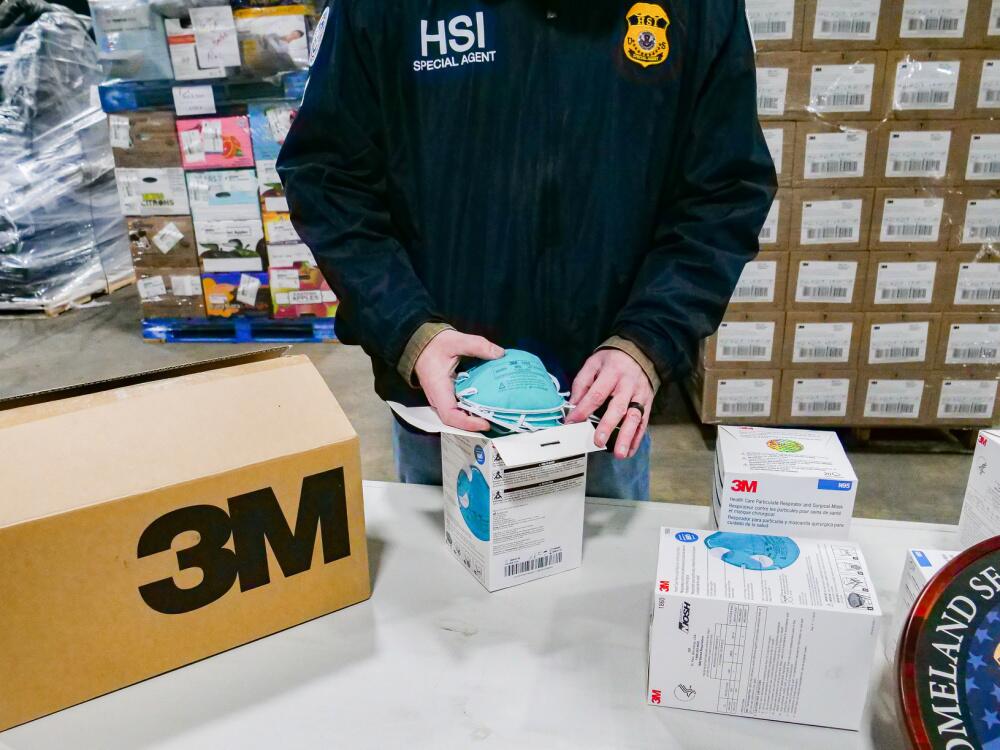Homeland Security Investigations (HSI) federal agents report they have seized approximately 11 million counterfeit 3M N95 respirator masks in recent weeks, the result of ongoing collaboration between the U.S. Department of Homeland Security (DHS) and manufacturer 3M to prevent counterfeit masks from reaching hospital workers and first responders.
“These seizures illustrate the ongoing efforts of HSI, CBP, and private industry in keeping our communities and medical staff safe and free from counterfeit products,” said DHS Secretary Alejandro Mayorkas. “Often, this battle is fought behind the scenes and is unknown to the general public, but you can be assured that the DHS workforce remains firmly committed to protecting the health and safety of our medical workers, the American public, and the integrity of the American economy.” “The public-private partnerships that are the hallmark of the IPR Center allow for swift and decisive action to protect consumers from fraudulent and potentially harmful or even deadly products. This work which is important on a blue-sky day to protect consumers, U.S. businesses, and the U.S. economy, is even more critical during the COVID-19 pandemic,” said ICE Acting Director Tae Johnson. “The IPR Center with its many government agency and industry partners are unified in their commitment to fight COVID-related fraud.”
The most recent enforcement actions occurred today, with special agents seizing hundreds of thousands of counterfeit masks from an east coast warehouse as part of an ongoing investigation into a criminal enterprise distributing counterfeit masks throughout the U.S. In the past two weeks, HSI has conducted multiple criminal search warrants and seized counterfeit masks in operations conducted in five states, from coast to coast, with more enforcement actions expected in the coming weeks. Since many of the counterfeit masks are produced abroad, HSI also works closely with its international law enforcement partners around the world to pursue leads into sources of supply and prevent shipments of counterfeit products from reaching U.S. shores.
The initial leads came to the HSI-led National Intellectual Property Rights Coordination Center last week through 3M, which shared reports of suspected counterfeits being purchased for healthcare workers. HSI mobilized quickly, initiating multi-state investigations into the individuals and organizations looking to profit from the sale and distribution of counterfeit N95 respirators.
At the same time, HSI notified about six thousand suspected victims of the fraud, in at least 12 states, including hospitals, medical facilities and others who may have purchased medical masks from the illicit dealers, urging them to immediately stop using the masks and to contact HSI immediately.
“3M is proud to partner with the U.S. Department of Homeland Security to help combat counterfeiting of 3M N95 respirators,” said Kevin Rhodes, 3M Deputy General Counsel. “This collaboration has helped prevent millions of counterfeit respirators from reaching frontline workers. We are committed to fighting the pandemic from all angles – manufacturing needed PPE, working to prevent counterfeiting, and helping ensure N95s get to where they are needed the most.”
The cases that resulted in the recent seizures of counterfeit masks are being conducted under HSI’s Operation Stolen Promise, an initiative launched in April 2020 to protect the Homeland from the increasing and evolving threat posed by COVID-19-related fraud and criminal activity.
As of Feb. 10, HSI has seized more than $33 million in illicit proceeds; made 227 arrests; served 222 criminal search warrants; opened 862 investigations; and analyzed nearly 80,000 COVID-19 domain names pursuant to Operation Stolen Promise. Working with U.S. Customs and Border Protection, more than 1,800 shipments of mislabeled, fraudulent, unauthorized or prohibited COVID-19 test kits, personal protective equipment, and other related items have been seized. These actions have kept counterfeit and substandard goods out of the supply chain and out of the hands of the general public and medical professionals; have protected individuals, businesses, and the financial system from fraud; have ensured the integrity of online marketplaces and COVID-19 related websites; and have resulted in violators being held accountable for their criminal efforts to exploit the pandemic for profit.
